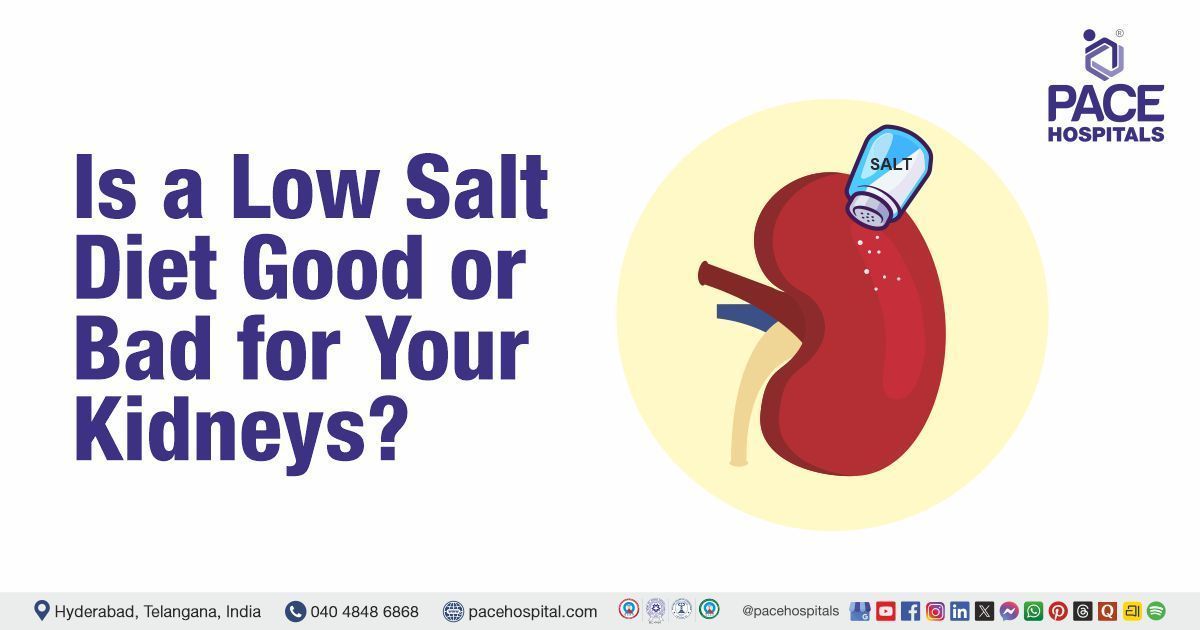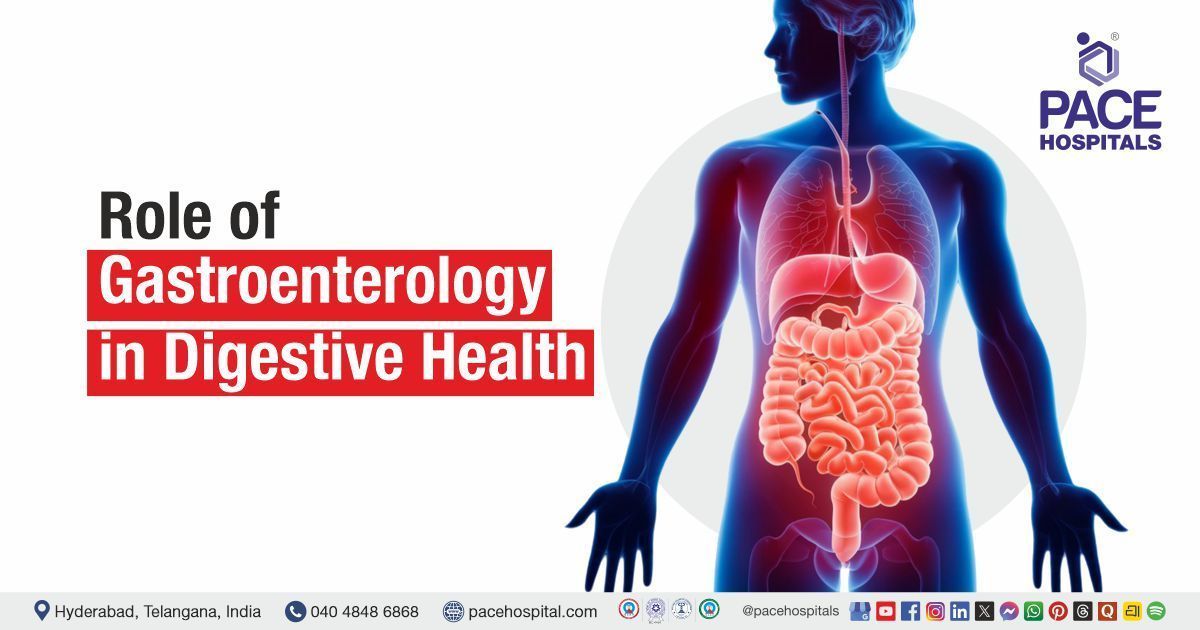Low Salt Diet and Kidney Health – The Link Between Sodium & Blood Pressure
PACE Hospitals
Written by: Editorial Team
Medically reviewed by: Dr. A Kishore Kumar - Consultant Nephrologist and Renal Transplant Physician
Introduction
Salt — a simple crystal that adds flavor to food — also plays a crucial role in maintaining our health. Salt is made of sodium and chloride, two essential minerals that support fluid balance, muscle function, and nerve signalling.
However, like most things in life, balance is key. Too much salt can harm the body, particularly the heart, blood vessels, and kidneys, while too little can also lead to complications.
So, the question arises: Is a low-salt diet good or bad for your kidneys?
Let's understand the science behind salt, kidney function, and how much sodium your body truly needs.
Understanding the Role of Salt in the Body
What Does Sodium Do?
Sodium helps maintain:
- The fluid balance inside and outside your cells.
- The transmission of nerve impulses enables muscles to contract and relax.
- The maintenance of normal blood pressure.
A small amount of sodium is necessary for good health. However, excessive intake can lead to water retention, which increases blood pressure — a leading cause of heart disease,
stroke, and
kidney failure.
The Kidneys’ Role in Regulating Sodium
Your kidneys are the body’s natural filters — constantly balancing sodium and water in your blood. When you consume excess salt, your kidneys must work harder to remove the extra sodium. If they can't keep up, sodium builds up, pulling water into your bloodstream, increasing blood volume and blood pressure. Over time, this damages the delicate filtering units in your kidneys called nephrons, leading to
chronic kidney disease (CKD) or worsening existing kidney problems.
The Link Between Salt, Blood Pressure, and Kidney Health
- High Salt = High Blood Pressure: When blood pressure rises, it puts mechanical stress on the small arteries in the kidneys. Over time, these vessels stiffen and narrow, reducing blood flow to kidney tissues. This makes it harder for the kidneys to remove waste from the body.
- Protein Leakage in Urine: Scientific studies show that high salt intake increases protein excretion in urine (proteinuria) — an early warning sign of kidney damage. A major study found that reducing salt from 10 g to 5 g per day lowered protein in urine by about 20%, helping protect the kidneys.
- Salt and Kidney Stones: High salt intake also raises calcium levels in urine, increasing the risk of kidney stone formation. Excess sodium reduces the kidney's ability to reabsorb calcium, which can crystallise with oxalate or phosphate to form painful stones.
- The Hormonal Link – Renin & Aldosterone: Your kidneys regulate blood pressure through hormones like renin and aldosterone. High or low sodium levels disrupt hormone balance and fluid regulation, so moderate salt intake is important.
How Much Salt Do You Really Need?
According to global health guidelines and research:
| Category | Recommended Daily intake | Approximate Equivalent |
|---|---|---|
| Minimum requirement | 3.8 g salt/day | Replaces sodium lost through sweat and urine |
| Ideal limit | 5-6 g salt/day | About 1 teaspoon (6 g salt ≈ 2.3 g sodium) |
| Maximum safe limit | 6 g salt/day | Exceeding this increases the risk of high blood pressure |
| Average Indian diet | 8-11 g salt/day | Almost double the recommended limit |
India's average salt intake is significantly higher than global recommendations — mainly due to processed foods, pickles, salted snacks, and fast food. Reducing salt from 10 g to 6 g a day can lower blood pressure and decrease the risk of heart disease, stroke, and kidney failure.
Is a Low Salt Diet Always Good?
While a moderate reduction in salt intake benefits most people, extremely low salt diets can be harmful in certain situations.
Possible Drawbacks of Very Low Salt Intake:
- Low Blood Pressure (Hypotension): Excessive restriction may cause dizziness, fatigue, and fainting.
- Electrolyte Imbalance: Sodium is essential for fluid regulation; too little can lead to muscle cramps and dehydration.
- Increased Insulin Resistance: Some studies suggest that very low salt intake may worsen glucose metabolism in people with diabetes.
- Activation of Stress Hormones: Extremely low salt intake may trigger higher renin and aldosterone levels, paradoxically increasing blood pressure in the long term.
The Balance Point:
For most adults, consuming 4–6 grams of salt daily provides enough sodium to maintain health while protecting the kidneys from damage.
The key message: ❝ Don’t eliminate salt — regulate it. ❞
How to Reduce Salt Intake Without Losing Taste
Reducing salt doesn't make food tasteless. Smart cooking and ingredient choices can keep meals tasty and healthy for the kidneys.
Practical Tips to Lower Salt Intake:
- Use spices and herbs — cumin, turmeric, coriander, garlic, and pepper instead of excess salt.
- Add lemon or tamarind juice for tangy flavor.
- Skip table salt during meals — remove salt shakers from your dining table.
- Limit processed foods — chips, salted nuts, sauces, ketchup, pickles, and bread are often high in salt.
- Check nutrition labels — choose foods labelled "low sodium" or "no added salt."
- Prefer fresh over packaged foods.
- Avoid adding salt to curd rice or salads.
- Drink adequate water to help the kidneys flush out excess sodium.
Hidden Sources of Salt in Indian Diets
Even when you think you’re eating healthy, sodium can sneak into your meals.
Common high-salt foods include:
- Pickles & papads
- Chutneys and sauces
- Cheese and butter
- Bakery items (biscuits, bread, pizza)
- Breakfast cereals and soups
- Packaged snacks (chips, bhujia, nuts)
- Restaurant and fast-food items
Preparing home-cooked meals with natural ingredients gives you complete control over salt content and quality.
The Role of Salt in Kidney Patients
People with existing chronic kidney disease (CKD) or high blood pressure need to be particularly mindful of sodium intake.
Why Salt Restriction Is Vital for CKD:
- Reduces fluid retention and swelling in the feet and face.
- Helps maintain target blood pressure (<130/80 mmHg).
- Reduces the burden on dialysis by limiting fluid overload.
- Decreases urine protein loss, slowing disease progression.
Doctors often recommend a low-salt diet of 4–5 grams per day for CKD patients, depending on their condition and blood pressure control. However, the restriction level should be personalised by a
nephrologist or dietitian to avoid electrolyte imbalance.
The Science Behind Salt Reduction
An extensive global study found that:
- Reducing salt intake by 3 g/day lowers blood pressure by up to 5 mmHg.
- This reduction translates to a 13% lower risk of stroke and a 10% lower risk of heart disease.
- Reducing daily salt intake by 20% can help prevent many heart and kidney diseases worldwide.
Limiting salt and being aware of hidden salt in foods are easy and effective ways to protect health.
Cost Benefits of a Low-Salt Diet
Cutting down on processed and salty foods not only protects your health but also your wallet. A fresh, low-sodium diet — emphasizing fruits, vegetables, grains, and home-cooked meals — reduces the risk of expensive treatments for hypertension, heart disease, or dialysis later in life.
In short: “Investing in less salt today can save you a fortune tomorrow.”
FAQs on Low Salt Diet and Its Effects on Kidneys
Is a low-salt diet good for your kidneys?
Yes. A moderate low-salt diet helps reduce blood pressure, prevents protein leakage in urine, and protects against kidney disease and heart problems.
How much salt should I eat per day?
Adults should limit salt to 5–6 grams per day (about one teaspoon). This includes all sources — cooking salt, processed foods, and snacks.
How much salt should I eat per day?
Excess salt causes water retention, raises blood pressure, and increases the risk of kidney failure, heart disease, and stroke.
Can very low salt intake harm my body?
Yes, extreme salt restriction can cause low blood pressure, fatigue, muscle cramps, and hormonal imbalance. Aim for moderation, not elimination.
Does reducing salt lower my blood pressure?
Yes. Cutting salt by even 3 grams per day can reduce systolic blood pressure by up to 5 mmHg and lower your risk of stroke and heart disease.
What are hidden sources of salt in food?
Pickles, papads, sauces, bakery items, chips, cheese, and restaurant meals are among the primary hidden sources of sodium in everyday diets.
How can I make my meals tasty without salt?
Use herbs, spices, lemon juice, vinegar, or tamarind to naturally enhance flavour without adding excess sodium.
Does high salt cause kidney stones?
Yes. High salt intake increases urinary calcium, promoting kidney stone formation. Reducing salt lowers this risk significantly.
Is low salt recommended for kidney patients?
Yes, kidney patients are often advised to limit salt to 4–5 g/day to control blood pressure and prevent fluid overload.
Can I use rock salt or Himalayan salt instead of table salt?
While rock salt contains trace minerals, it has the same sodium content as regular salt. Use all salts in moderation.
Share on
Request an appointment
Fill in the appointment form or call us instantly to book a confirmed appointment with our super specialist at 04048486868











